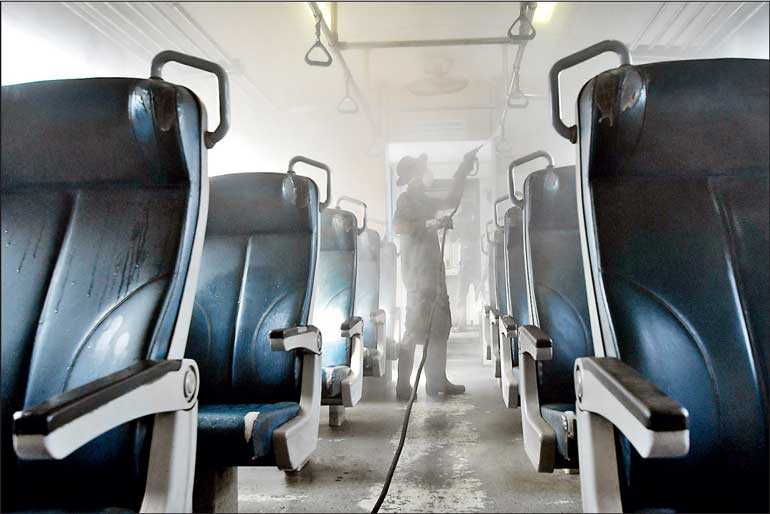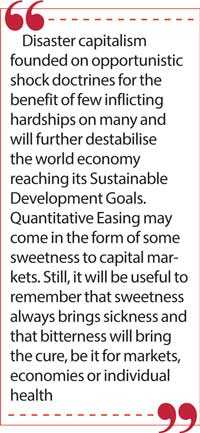Saturday Feb 21, 2026
Saturday Feb 21, 2026
Friday, 20 March 2020 00:30 - - {{hitsCtrl.values.hits}}

By Jayasri Priyalal
The COVID-19 pandemic is spreading across all the regions. As of 17 March, doctors from Peking University Medical College Hospital (PUMCH) reported at a press conference arranged by China Global Television Network (CGTN) that they have successfully curbed the spreading of the COVID-19 in Wuhan city. In other words, the peak of contagion has been brought under control. 
The team of doctors repeatedly said at the press conference that through various containment actions they have managed to prevent, test and identify the patients and quarantined them to curb the spread of the virus. Still, they have not yet invented a proper treatment for the disease.
Ironically, Peking University Medical College Hospital was founded in 1921 with financial assistance from the American Rockefeller Foundation. The philanthropic spirit of American capitalism just a century ago is now something we need to revisit to assess to what extent social values have eroded in search of economic value in market capitalisation forms in countries.
On 26 December 2019, the first three persons contaminated with the coronavirus in one family were diagnosed in Wuhan, China. The outbreak started on that day and is now creating ripple effects across all continents.
A virus not visible to the naked eye has shown the real power of nature over the abstract markets. COVID 19 has unleashed its power of flow, disrespecting any boundaries without any discrimination and differentiation. Although the virus is less lethal than some other viruses, the panic that has generated across the financial markets is a matter for concern.
All stock markets are trading in negative territories and wiped out trillions of wealth. Accumulated wealth without work just buying and selling, and speculating in the stock market just got a feeling of the richness of seeing the unpredictable market indices taking a beating. And that too with cheap money dished out by the central bankers as quantitative easing measures as government subsidies to the affluent in society.
The Indian Ocean boxing day tsunami hit 15 years ago on 26 December 2004; the tragedy took away about half a million lives, causing colossal destruction to many countries including Indonesia and Sri Lanka. As reported in media, the highest-ever erratic peak of the Jakarta stock market index was recorded the day following the tsunami. Similarly, on 26 January 2001, a 7.7 Richter scale earthquake of 20 seconds killed over 20,000 people in Gujarat in India. The following day, the Bombay Sensex stock market index recorded a substantial peak.
If economists continue to use outdated performance indices to measure the health of an economy, these two cases are solid examples of the real face of disaster capitalism. Miseries and tragedies faced by fellow human beings as a result of natural disasters turned into opportunities for those who speculate and manipulates markets. So, markets are useful if you are on the right side of the market. Therefore, it is quite natural that the upbeat of market sentiments reverses and fictitious wealth values evaporate when uncertainties and suspicions set in and politicians panic and jump into actions to prop up market sentiments.
The Directors of PUMCH revealed that the Chinese medical authorities and health officials had done their best, sacrificed immensely to the arrest the epidemic, and brought it under control by mid-March 2020. President Donald Trump downplayed the seriousness of the COVID-19 virus as if the USA was immune from the threat. But, the governors and mayors of various states in the USA realised the gravity of the danger of COVID-19 and took appropriate actions and leadership to contain the outbreak. And as reported in media, the US health agencies are underprepared to carry out the necessary test to identify and isolate the virus-affected patients.
On 6 March, FDA approved commercial production of test kits and Swiss pharmaceutical company Roche and medical device maker Thermo Fisher had undertaken to manufacture. Yet, there is no country or a pharmaceutical company which has come up with a vaccine and the PUMCH doctors too confirmed that they were still working on finding an appropriate cure to treat the patients. All are operating to ease suffering caused to victims by the virus, in other words treating for the symptoms.
The scientists and doctors are struggling to find a cure or preventive vaccine to contain COVID-19 virus; central bankers have already prescribed the Quantitative Easing antidote for the anticipated economic downturn.
Economics is not a science; it is still a form of a prediction; many economic theories and solutions proposed cannot be first tested in a laboratory and introduced to the market. Those who have faith in disaster capitalism panic when stock markets behave erratically. And they unface the true private-public partnerships and get Central Bankers to clone cheap money so that vulture funds and private equities could make a killing in nose-diving markets.
The Quantitative Easing formulas introduced after the 2008 financial crisis, together with acute austerity measures, have worsened the real economic activities in the crisis-hit countries impoverishing the poor and the middle class, but kept the share markets active for the benefit of privileged via unconventional monetary policy tools without putting in place useful fiscal policy tools which has widened inequalities impacting marginalised communities heavily. The central bankers’ QE cure will be worse than the disease spreading across the global economies heading towards a prolonged recession emanating from the COVID-19 pandemic.
Disaster capitalism founded on opportunistic shock doctrines for the benefit of few inflicting hardships on many and will further destabilise the world economy reaching its Sustainable Development Goals. Quantitative Easing may come in the form of some sweetness to capital markets. Still, it will be useful to remember that sweetness always brings sickness and that bitterness will bring the cure, be it for markets, economies or individual health.
Medical science, with the help of advanced digital technology, will undoubtedly find a vaccine for COVID-19 soon. Still, economists and central bankers will have to find new policy tools thinking aloof of failed formulas tried and tested in the era of the first Industrial Revolution.